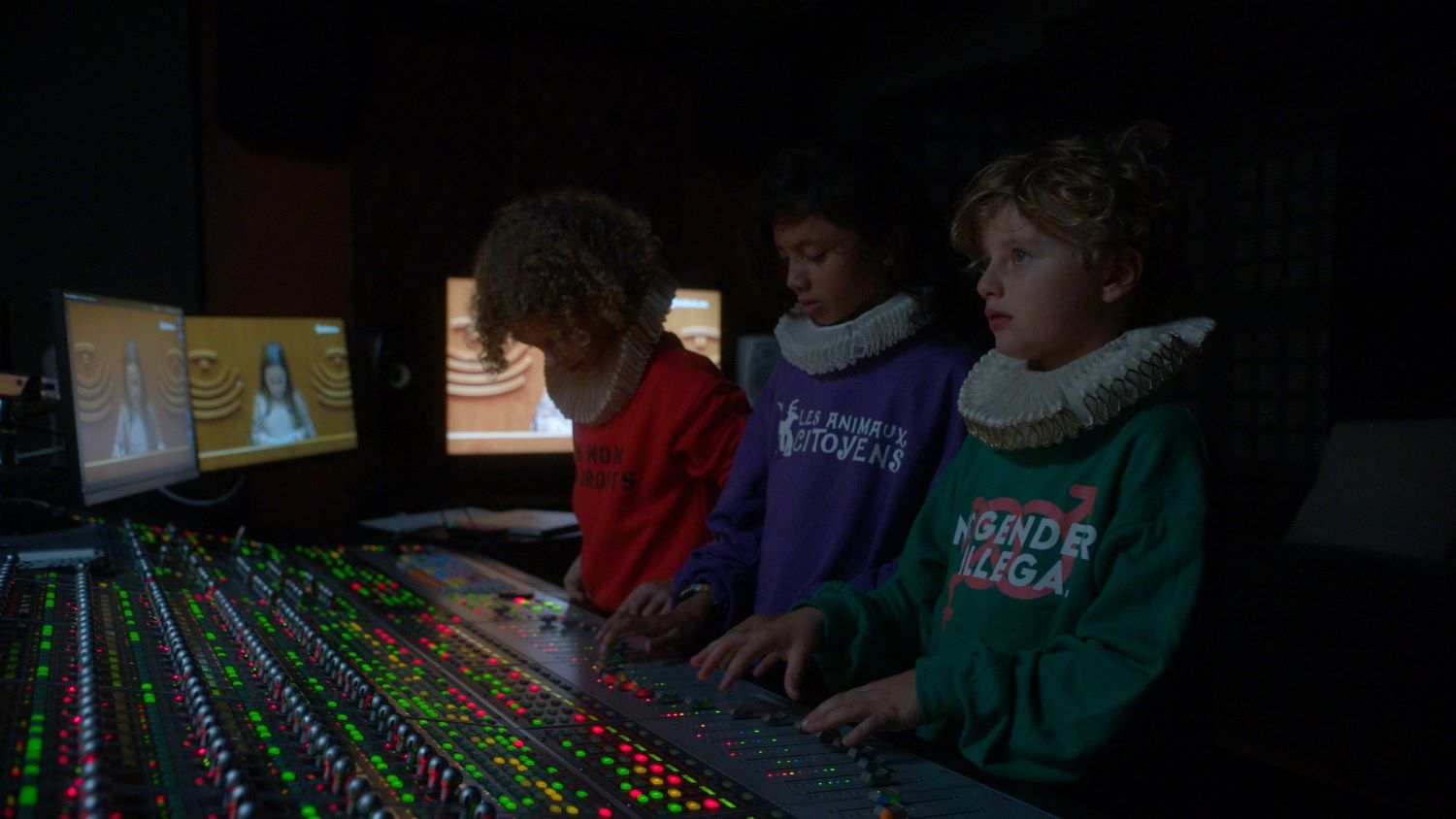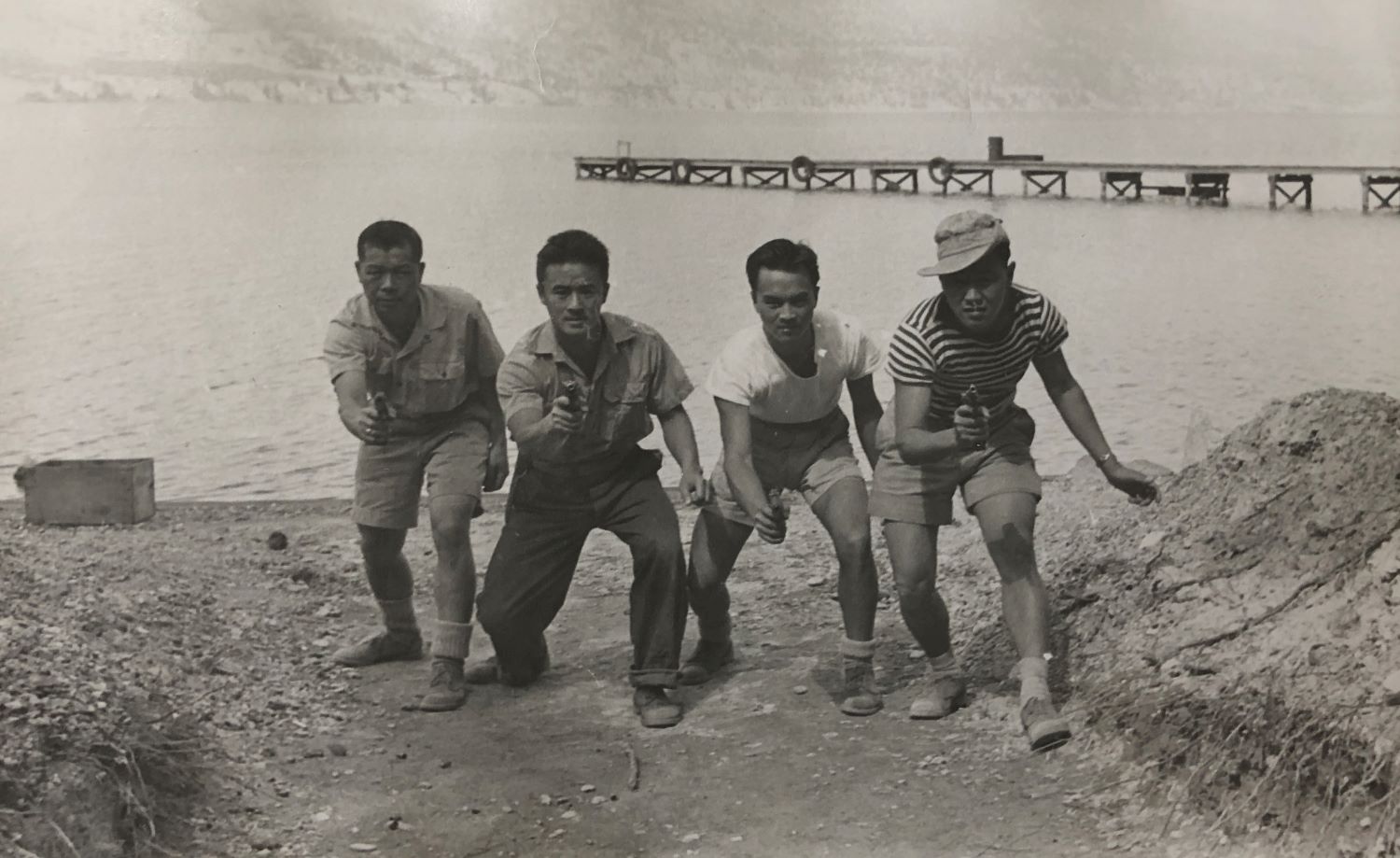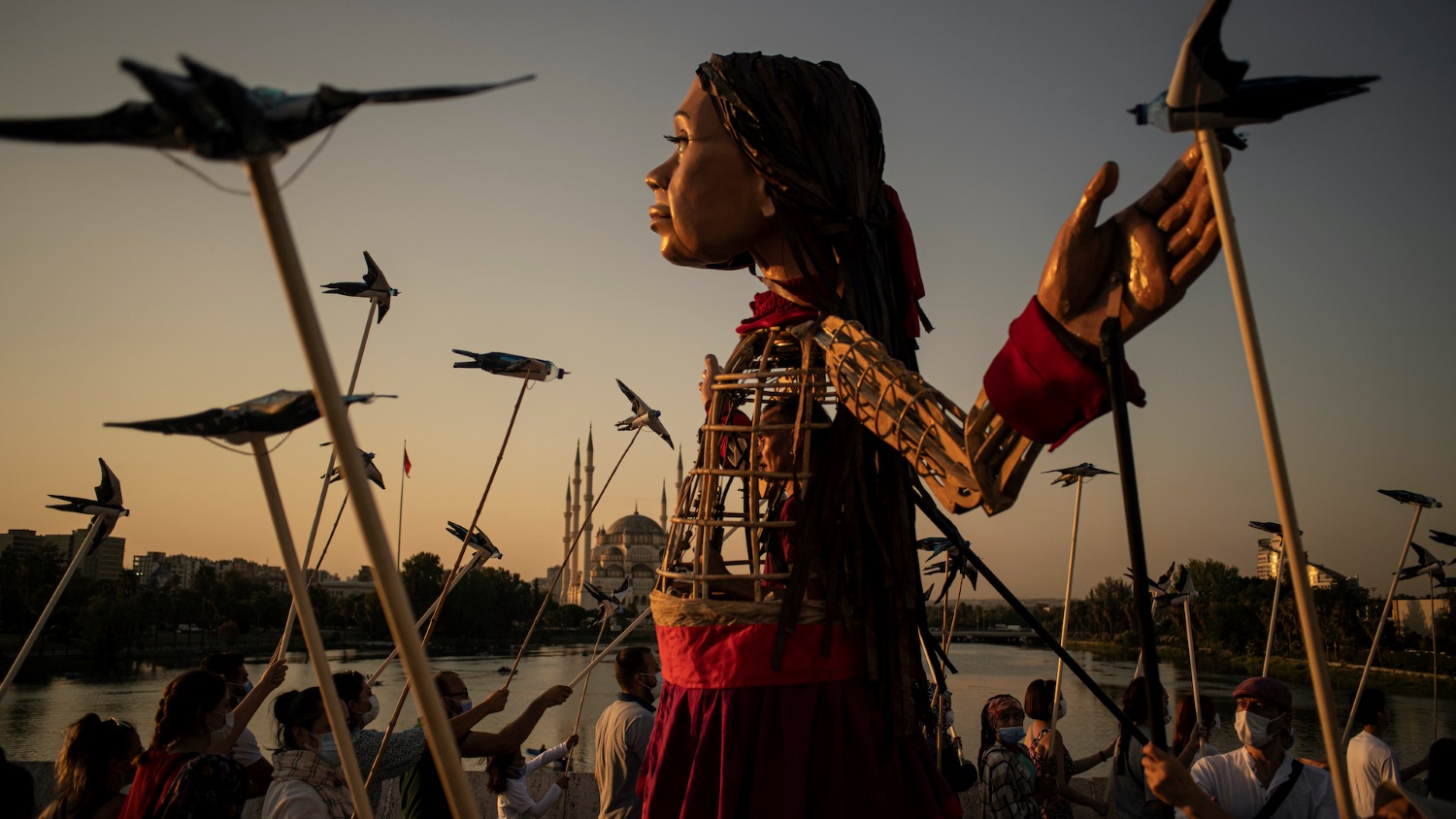Paul Preciado had never thought about writing a biography before French-German broadcaster Arte approached him with the opportunity to make a film about his life as a trans man. Sure, the philosopher, critic, curator, and now director, had written the personal books Testo Junkie, which blends intimate accounts and musings on his experience, self-administering testosterone with academic theory on biopolitics, but it was not truly a biography. The work inspired the creation of Preciado’s own genre, the “body essay,” so when confronted with the idea of biography Preciado looked to Virginia Woolf who paved the way in subverting the genre by writing a narrative about a fictional character who transforms from a woman to a man over a life that spans centuries in her novel Orlando: A Biography.
In his debut hybrid film, Orlando, My Political Biography, Preciado enters into dialogue with Woolf and her novel. Collaborating with trans and non-binary people of all ages who take on the role, they tell the story of Woolf’s Orlando along with their own. Preciado weaves personal narratives, monologues, poetics, politics, song, play, and dance, into Woolf’s narrative, blending her language with his, creating a wide ranging and vibrant portrait of trans life that refuses to be confined to preset notions of form or genre. For Preciado, it is the truest way he could think to narrate his own life, or to film it. POV spoke with Preciado at the 2023 Toronto International Film Festival where the film had its Canadian premiere as part of the Wavelengths programme
POV: Allegra Moyle
PP: Paul B. Preciado
This interview has been edited for brevity and clarity.
POV: To begin, I was interested in your use of the genre of biography. Virginia Woolf subverts the genre in her novel and you’ve carried this subversion in the making of this hybrid film. But I realized that you’re playing with genre precedes this film as even with your book, Testo Junkie, you begin by writing, “This isn’t a memoir,” and later state that it’s a fiction. So, I was wondering what is, perhaps, your resistance to biography and what do you think are its limitations?
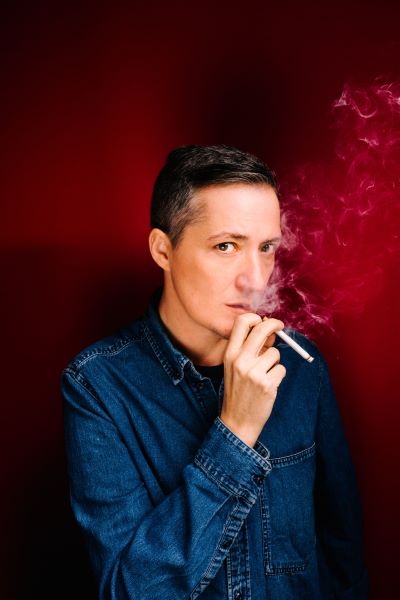
PP: It’s a very precise question and I agree with you. For me, it would be an exaggeration to say that everything is fiction, but I would say that there are different kinds of fiction. Maybe this is a little bit complicated, but in philosophy I would say that different kinds of fiction work according to different regimes of truth. So, there are fictions that have been legitimized historically as being the truth, others that have no truth value and can only have truth value, for instance, with testimony, especially for those that have not had the opportunity of telling their own stories. When they tell their story, they have to tell it according to a certain genre, which is basically these testimonial words. For instance, no one says that someone representing normative society is doing a testimonial. They just say, well, this is a description. Whereas, when we have someone like a migrant, non-white, trans, non-binary, disabled person, etc., their words would immediately be understood as testimonial. This means for me that, in a sense, it is discredited as opposed to what we traditionally think, which is that it’s great to give testimony.
Giving testimony means that your word or your representation–whatever it is–that these kinds of representations would come and fit inside a particular kind of narrative that is already given for you. It’s basically like, come and tell us your story of migration. Come and tell us your story of being a woman in a patriarchal society. Why don’t we ever say, come and give us your story of being a man in a hypermasculine patriarchal society? That is not supposed to be a testimony. That is supposed to be the state of affairs, right? So, in a sense I am resisting these particular regimes of truth that work just for the minorities. That’s why I’m highlighting that all kinds of narratives–whatever they are–are fiction. They just have different truth values.
POV: Typically, a biography is about one person. In your film you transform the individual into a collective by having many Orlandos. How does that contribute to your film being a political biography?
PP: Yes, precisely going from this individual to the collective was a way for me to introduce political history into this biography. But still, I think that there is also a risk when we do things like a documentary, or a book, or whatever. I also see the limitations of the work that I’m trying to do and I’m struggling with it. For instance, the risk in this case was creating an almost monolithic Orlando that would swallow all the multiplicities and the differences, and I didn’t want to do that either. It was tricky because in the beginning when I was choosing the parts of the book that we would adapt, trying to work with the Orlandos to speak the language of Virginia Woolf, I immediately saw that the risk would be that, in the end, they are faceless. They’re almost like actors that embody Orlando and it would be like there are many, they are coming from different backgrounds, they are different people, different ages, but all of them are the same. So, it’s this tension of, at the same time, belonging to a common political genealogy but still allowing for full heterogeneity. All of them are completely singular.
For me, it was really important not to stick to an idea of identity politics because I think now, and especially in the United States–I don’t know how it is in Canada–but I see a very tense political context where if you’re trans it’s because you’re having hormones. It’s because you changed your name, and so on. And in the film, it was super important to allow for many different ways of being trans and of being non-binary that go beyond, in a sense, what normative psychology, or the medical discourse, or even the legal discourse says. Many people don’t have passports. That’s what it is today to be trans. Many people don’t have access to hormones or don’t want to take them. That’s also a way of being trans. So that was important for me that there wasn’t just the right way of being trans that, in a sense, conforms to this idea of giving testimony and being in the position of a good trans person who will tell you their stories.
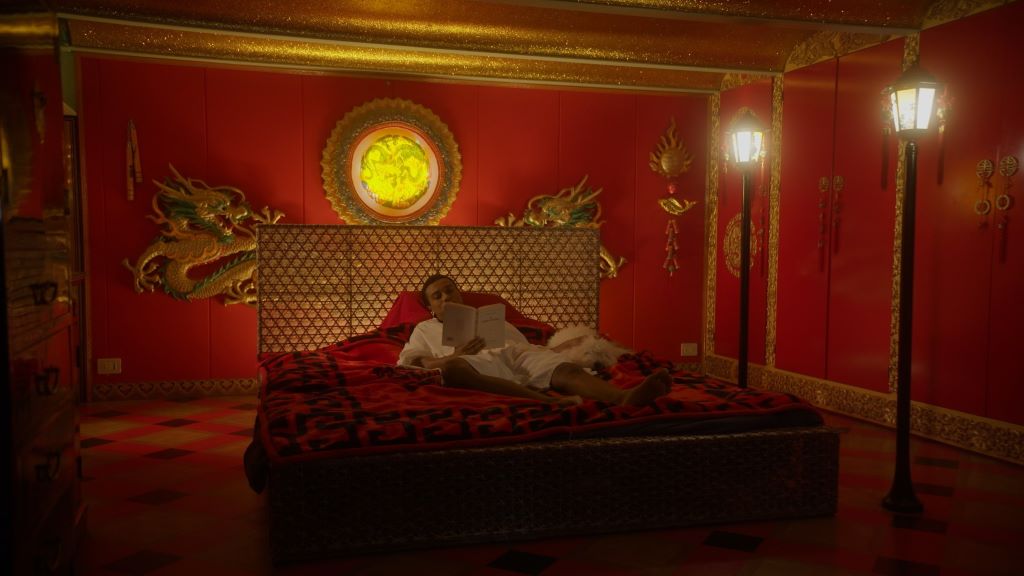
POV: It’s interesting to hear you say that because I was struck in watching the movie by how seamlessly their individual stories and musings seemed to bleed into Virginia’s Orlando. And I think you succeeded in that the subjects maintained their individuality. I think, in part, that has a lot to do with how they present as well.
PP: Yes, absolutely.
POV: You already touched on it, but what was the process of collaborating with the other Orlandos? How did you pick which parts of their story would tie into the Orlando narrative?
PP: Well, that’s also on the level of language. The documentary became fiction in a sense. My contention, as a theorist in any way, is that all documentaries are fiction in the way of narrating stories. But the more I was working with the actors, with the Orlandos, my producers were like, “Paul, you’ve abandoned documentary.”
Of course, the issue of age was important because I started with the young Orlandos and then moved to the older ones. The oldest person of the film, Jenny, has a fully Orlando story. When she’s telling you the story of her life, you’re like, this is beyond Orlando. It became so strong and big that if I introduced it in the film, it would swallow the other narratives. The idea was basically finding this fluidity between the words of Virginia Woolf and their own words. And for me, this was the biggest challenge of making the film. I thought, if this is working then my methodology will work and we’ll have a film. It was a lot of work with them, but it was also very liberating. And once they got into this character, I think that also helped us a little bit to overcome different difficult situations in which they are every day and we are every day. So suddenly you have this ritual of wearing the collar, and as soon as the collar was on it was like, “Okay, I am Orlando.”
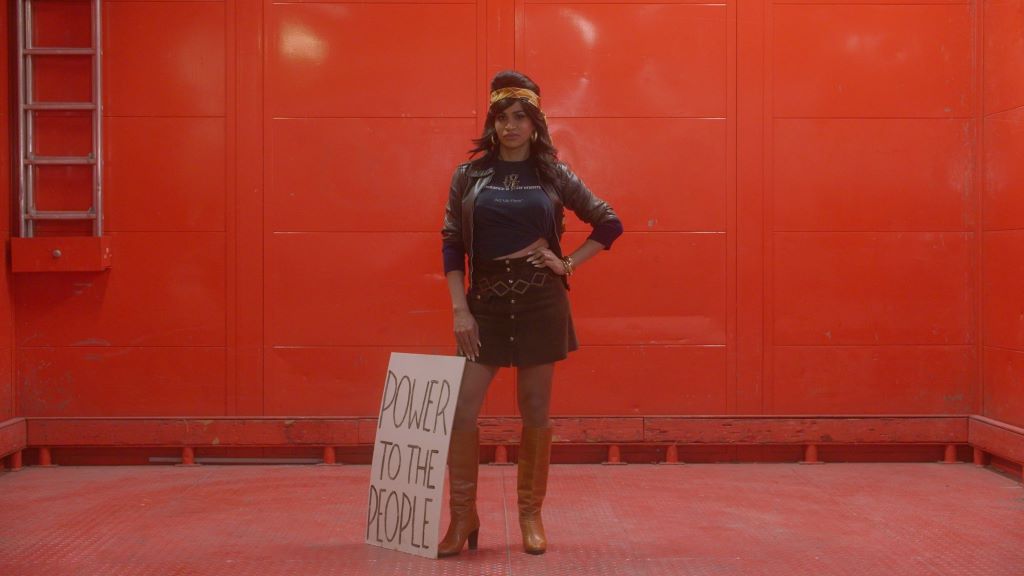
POV: Why was it important to have a sense of playfulness in the film?
PP: We can read it as playfulness, but for me it’s almost like installing freedom as this conscious exercise. I’m not saying that I know what it is, this practice of freedom in particular. But that freedom is a practice that we can more or less organize. We pretend that we don’t know but I think we do know that certain conditions allow for this exercise of freedom. So, I guess that was my aim.
POV: Was behind the scenes as playful as the end result?
PP: I think so. I think that at least I wanted the process of making the film to resemble the film in a sense. My producers were always telling me, “Paul, we don’t do things like this,” because I would ask people to come really in advance to work with them a lot, even inviting their friends and family to be a part of the conversation, especially for the teenagers so that they felt comfortable. But yes, since I hadn’t done a film before, I thought that I would do it almost like the micropolitical workshops I’d done. I did a lot of drag king workshops when I was in my twenties. So, in a sense I used that methodology to make the film.
Everyone was super respectful because people were very generous but also extremely vulnerable in front of the camera. Even before making the film, I gathered the team and spoke about how I wanted this film to be made and how it was impossible for me to film trans people the way they’re normally filmed. For instance, with my camera operator, it was super important for him to understand that I didn’t want a particular way of filming which would basically transform the person into this object of gaze. It would be that he [the camera operator] is mostly in the middle of the scene and things are happening around him, but there is never an assigned objectivity .
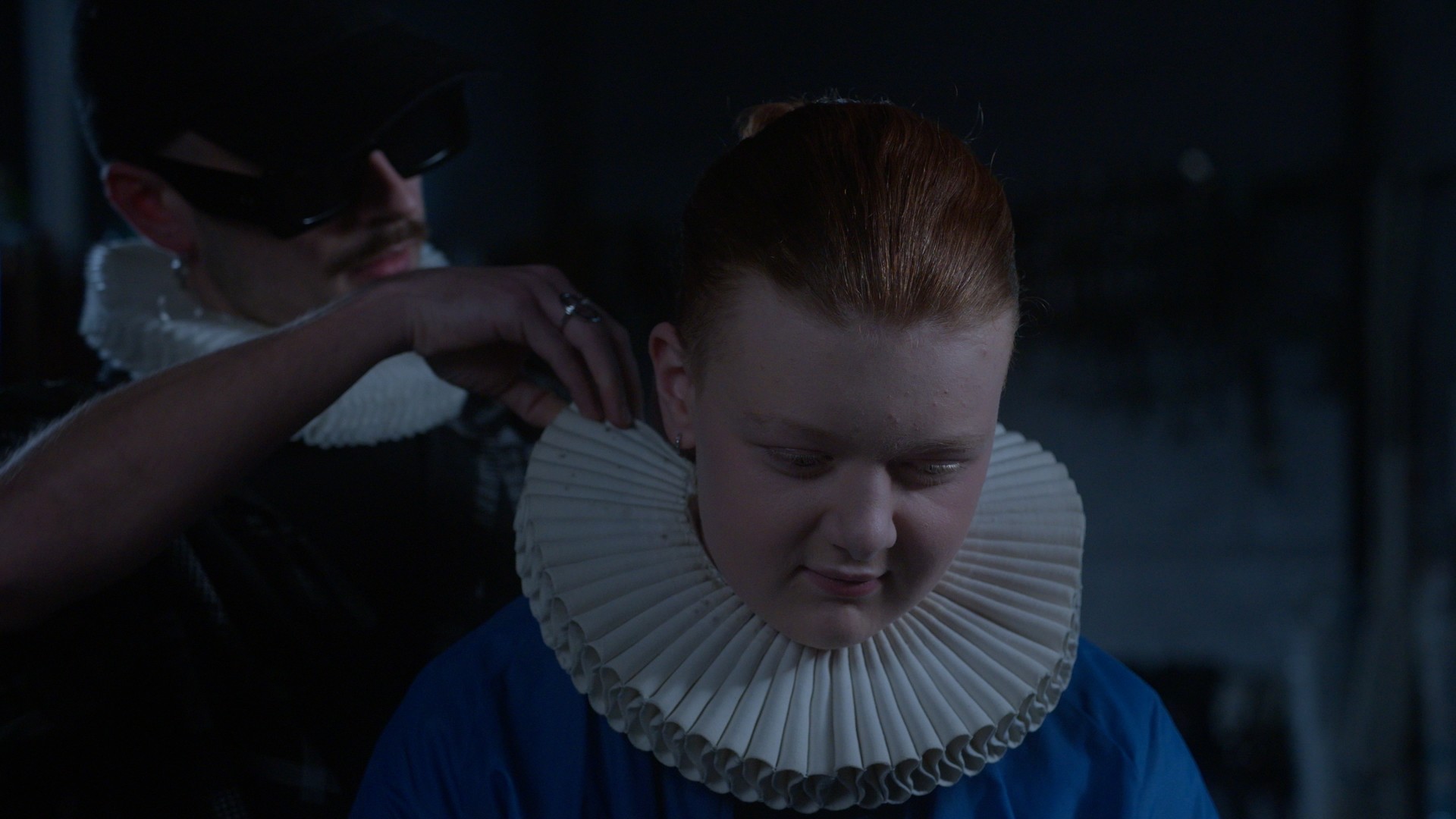
POV: I had a question about that because, again, in Testo Junkie, referring to Teresa De Lauretis, you write about how film and filmmaking devices have served to uphold and partake in the creation of the gender paradigm.
PP: Absolutely. Yes, like gender technology.
POV: Exactly. How did this inform your approach in using film to not simply challenge the gender paradigm but deconstruct it?
PP: That’s a difficult question because, of course, this knowledge was with me, but also, that became a little bit of a fear as well. I’m not going to say that it’s easy, but it’s easier to criticize and think about film as this technology of gender and comment on other films and other images, but it’s much more difficult when you start to make images yourself. And in a sense, that knowledge was a little bit paralyzing at the beginning because I thought, how am I going to step out of this normative gaze? People speak a lot about female gaze, male gaze, but for me it’s really the binary gaze. For instance, when I was shooting, my producers and other people who would come to set would all ask the same question, “Is it a girl or a boy?” all the time. And that’s exactly what I’m trying to challenge in this film. I don’t want them to be filmed as a boy or as a girl because as soon as you notice if it’s a man or a woman, you film differently. The camera will establish a different relationship with that body. I was trying to film in a different way. I’m pretty convinced that, yes, it’s true that film is a technology of gender, but it’s a very complex technology of gender because it’s not just about, for instance, the camera position. There are so many levels because film is so complex, from the writing, to the way you work with the actors, to the shooting of the film. When you are editing it’s exactly the same. Even with my editor, who is a fantastic editor, we had so many conversations about editing in a non-binary way.
POV: What does that look like?
PP: Well, I guess that many of the films that we see are edited in a very binary way with always these counterpoints of masculinity or femininity. This play reinforces the gender binary in a way. It would also be the same with fiction and documentaries, with all these binaries that we have. For instance, even the voice of the author was a question I had when I was making the film. My presence in the film is really my voice, right? And at a certain point, I thought, maybe this is too much. I tried to find a way for my voice to never be this corrective of what is happening but telling another story. Almost like a parallel track that goes in another direction and that doesn’t reinforce this difference between fiction and documentary, or before and after, especially on trans issues. I’m not going to say that I watched all of the trans films…
POV: But your fair share.
PP: A fair amount. They’re so much about truth and about proving where you are coming from– where you are going. Always these moments of nakedness of being the objective truth, of being the anatomy. Before I even knew what I wanted to do in the film, I knew many things that I didn’t want to do. So, for instance, even people who know my books like Testo Junkie, they probably expected for there to be more sex in the film. But I didn’t want to have sex in the film because I knew that underlying sex is this revelation of anatomy. I tried to avoid so many binary ways of representing the trans body.
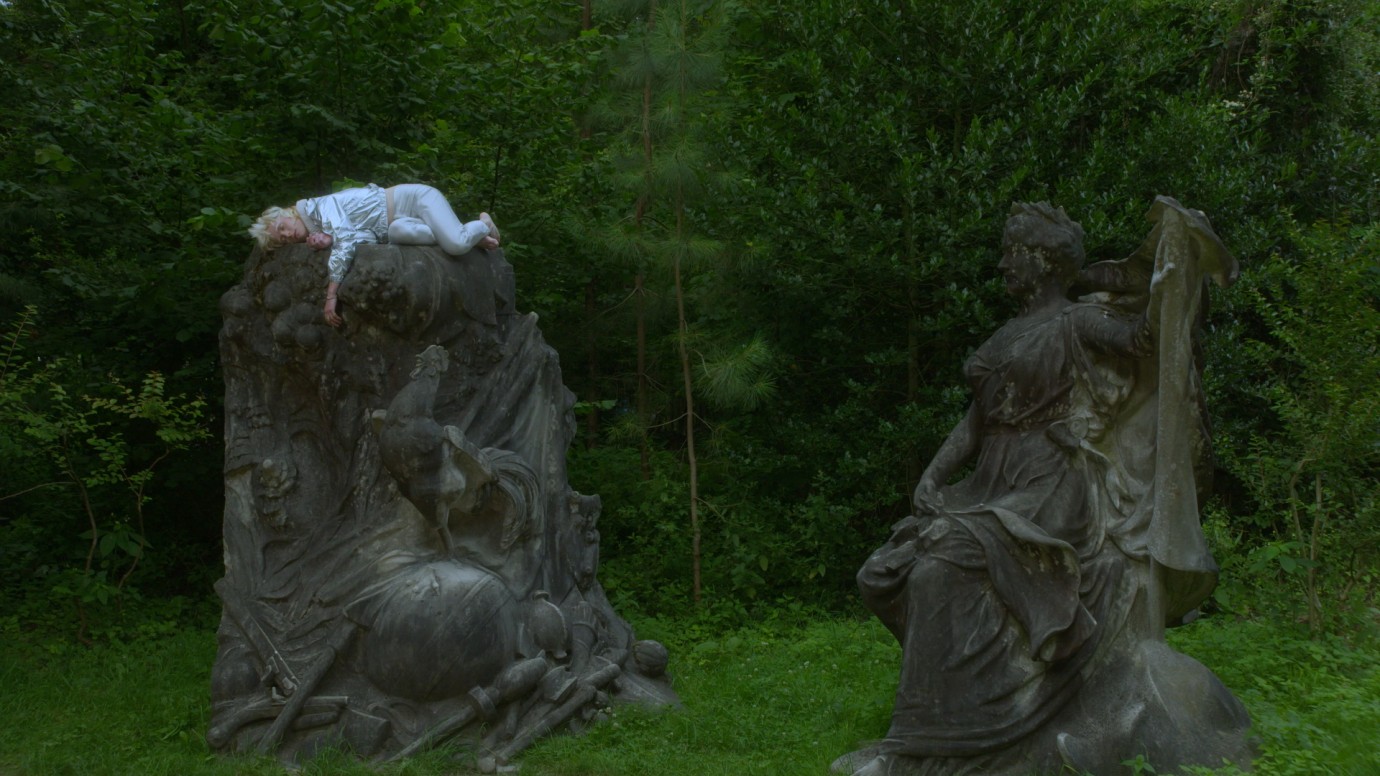
It’s not just that cinema is a gender technology, it’s that gender differences have been created and constructed through vision. I think that in a blind world, in a world without vision and images, it would be very difficult to assign gender. Very difficult. And so, it’s almost like vision is the first thing that we do when we see someone. It’s almost like this visual assessment. So, I think in every scene of the film I was thinking, how am I going to twist that? We have so many preconceptions and in the way, images have been filmed and in the way, heterosexuality has been constructed through the image. So yeah, it’s a little bit like unlearning vision, binary vision. I think this is such a historical visual paradigm that no one can just by themselves invent something completely new, but the film is undoing a bit of that and finding a small point of light.
POV: It seems like taking a poetic approach to the film assisted in achieving that. I really liked a line in the film that was something like, “When you don’t have the language for something you have to rely on poetry.” Would you say that poetry, in essence, is a non-binary form?
PP: Oh, absolutely. Out of all forms I think that poetry is the most non-binary one. Absolutely. Thank you for that question because I didn’t think about that before. When you read Orlando by Virginia Woolf, it’s a very funny book. It’s full of adventures. It’s quite crazy. It’s sometimes very baroque. It’s quite exaggerated. It’s very hyperbolic. She’s making fun of many things to do with masculinity at the time. It’s maybe not the most poetic book of Virginia Woolf’s if you compare it to Mrs. Dalloway or other books. I didn’t think consciously that it would be a poetic film, because I think that that’s something really difficult to decide. But poetry came little by little. For me, the participants themselves, the Orlandos, brought this kind of poetry to the film.
When I was rewatching some of the archival material that I included in the film from the history of trans people, I realized that all these trans people who’ve been filmed at different moments, that at the same time [they] are so strong and vulnerable, [they] all have these moments of pure poetry. Where is this coming from in a context that is so violent and so repressive? How do you suddenly invent something like that?




